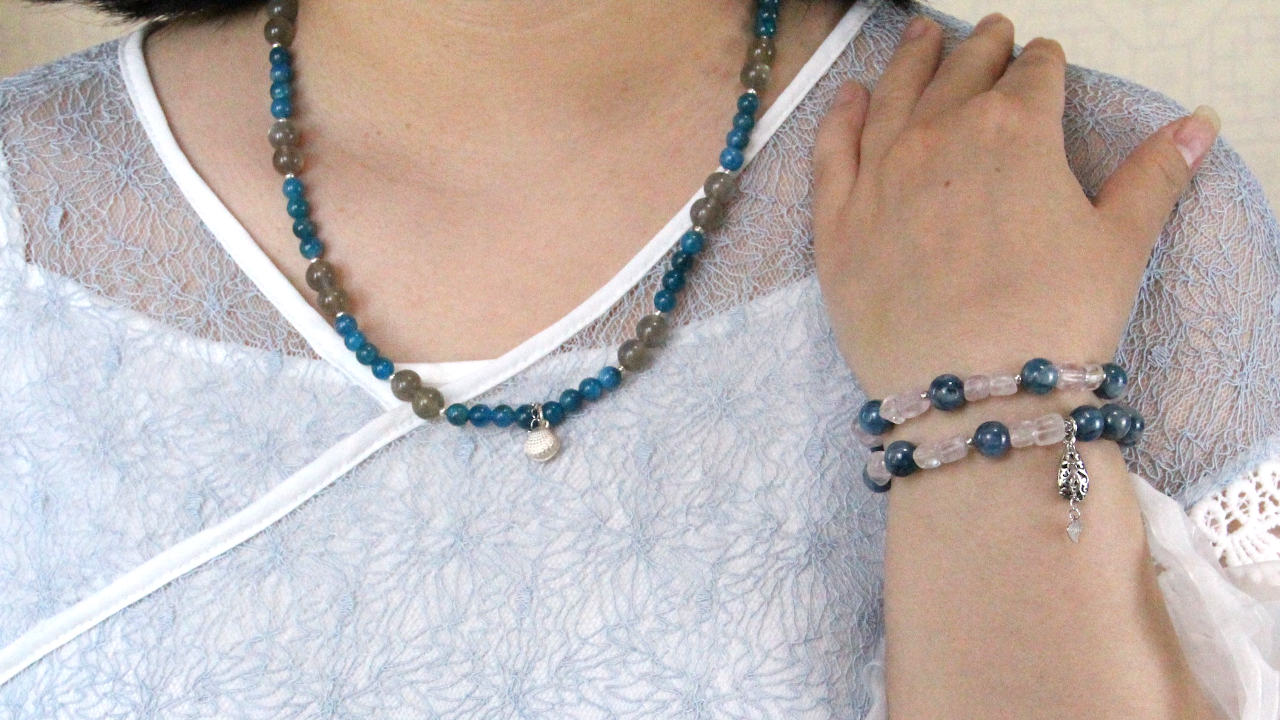-

Apatite Necklaces, Earrings & Gemstone Bead Bracelets
Apatite necklaces and earrings with blue apatite bracelets including silver pendant necklaces with moonstone bead aquamarine jewellery


YAN Blue Bead Necklace Apatite & Moonstone Small Necklace Style
Ocean - Apatite - Blue
£ TBA

YAN Blue Earrings Apatite & S925 Silver Flower Dangle Earrings Style
Princess - Apatite - Purple
£ TBA

Apatite Necklaces, Earrings & Gemstone Bead Bracelets
Cool ocean colours in ranging apatite necklaces and earrings and apatite bracelets with overall blue tones and fresh feeling from this natural gemstone jewellery.


YAN Chalcedony Pendant Necklace Bodhi Bead & Quartz Long Necklace Style
Rainbow - Bodhi Root - Multi Colour


YAN Natural Bead Bracelet Bodhi Bead & Quartz Long Bracelet Style
Rainbow - Bodhi Root - Multi Colour


YAN Red Pendant Necklace Garnet & Agate Long Necklace Style
Rainbow - Garnet - Red


YAN Rainbow Bead Necklace Tourmaline & Quartz Small Necklace Style
Rainbow - Tourmaline - Multi Colour


YAN Rainbow Bead Necklace Tourmaline & Quartz Short Necklace Style
Rainbow - Tourmaline - Multi Colour


YAN Rainbow Bead Necklace Jade & Lapis Lazuli Short Necklace Style
Rainbow - Jade - Multi Colour


YAN Rainbow Bead Bracelet Jade & Lapis Lazuli Long Bracelet Style
Rainbow - Jade - Multi Colour


YAN Rainbow Pendant Necklace Tourmaline & Agate Long Necklace Style
Rainbow - Tourmaline - Multi Colour


YAN Rainbow Star Pendant Necklace Tourmaline & Agate Small Necklace Style
Rainbow - Tourmaline - Multi Colour


YAN Rainbow Bead Necklace Tourmaline & Agate Small Necklace Style
Rainbow - Tourmaline - Multi Colour


YAN Rainbow Leaf Pendant Necklace Tourmaline & Quartz Small Necklace Style
Rainbow - Tourmaline - Multi Colour


YAN Rainbow Bead Pendant Bracelet Tourmaline & Quartz Long Bracelet Style
Rainbow - Tourmaline - Multi Colour
-

Moonstone Jewelry a Popular History
Moonstone jewelry designers believed this gemstone was moonlight frozen into crystal, once popular in art nouveau and ever fashionable as cabochon pendant necklaces and beautiful bead bracelets
Moonstone a gemstone that has been fashionable across the millennia for a play of light termed “Adularescence” – displaying as waves of lustred colour seemingly like moon rays dancing upon the surface of an enchanting ocean.
Finding a foothold in modern history within the art nouveau era, moonstone jewelry was adulated by designer René Lalique in naturalistic artwork and later adorned as a vessel to express connection to the spiritual world in the later “new age” movement of the late 20th century.
Moonstone is one of the most important gemstones of the feldspar group of silicate minerals, with opalescent shimmer, myriad colours and adorned as a deity stone with lunar connection since ancient Greeks likened it to trapped moon light over two thousand years ago.
Moonstone in Art Nouveau and New Age Fashion
Starting from the turn of the 20th century the Art Nouveau movement embraced natural forms with colourful design and curving free shape, casting away the rigour of previous traditionally staid styles.
René Lalique was a French designer who as apprentice goldsmith to the leading Art Novea artist of the time Louis Aucoc forged a deep connection to these visionary ideas of nature inspired design.
With flowing natural lines of delicate golden tracery he created numerous examples of tiaras, pendant necklaces and numerous other works many featuring moonstone that with it’s smooth cabochon lines and pearly iridescence acted as natural point of art nouveau style.
Moonstone jewelry shone once again on the global stage in the later “New Age” movement of the 1970’s.
With spiritualistic beliefs emphasising independence of soul and connection to a greater cosmos that transcended material existence, the new age movement in moonstone jewelry found natural plays of light and colour that integrated well within their a spiritual framework of contrasting light and energy.
Appearance of Moonstone
Presenting numerous colours from colourless to pale browns including blue, peach, pink and yellow, moonstone is highly light reflective and along with better known “adularescence” some specimens show a “cat’s eye” of banded light.
Adularescence otherwise known as a light “shimmer” is created from tiny nanometre layers of light changing structural differences that exist throughout the structure of the moonstone crystal.
Under the right lighting moonstone displays an impression of moon light rippled across an ocean surface that is created by changes in the path of light as it passes across these variations in the crystal structure.
Contemporarily sought after in art noveau and much later the new age period moonstone jewelry pieces, this “shimmer” of wave like light is mostly found producing a white rippled lustre, though can also be found in orange and blue lustre.
Modern moonstone’s currently most sought after examples are those close to examples which are highly reflective to light and exhibit a strong blue “flash” of adularescence visible from a range of angles when mounted as highly polished cabochon jewels.
Moonstone Jewelry in History
Known since ancient Greek times as the gemstone “Aphroselene” – a merger between the names of ancient Greek goddesses of love and the moon, moonstone was believed by philosophers of the Roman Empire to be drops of moonlight frozen into crystal.
Roman historian “Pliny the Elder” wrote of moonstone with it’s shimmer of wave like light as being connecting to the changing phases of the moon and this gemstone was associated to Roman and Greek lunar deities.
Moonstone jewelry is associated with the moon in Roman and Greek mythology, the goddess Selene was a Greek mythological figure, daughter of the Sun god Hyperion who represented the Moon as a silver chariot chasing across the sky.
Later deity Artemis whose temple at Ephesus is one the seven wonders of the ancient world also represented the Moon and is twin sister of Apollo.
Roman and Greek peoples associated moonstone with deities that represented the moon and though they were less frequently worshipped than household deities they could be worshipped anywhere in the world where the moon was visible.
Moonstone jewelry of these ancient times would likely consist of either natural stones polished to best show the pearly shimmer of adularescence or be ground into cabochons and set into precious metal setting pendants and rings.
Moonstone is still mined from the Alp mines of St. Gotthard in Switzerland where it has been found since ancient times with most deposits found across the world presenting with clear colour and visible blue lustre, while deposits in Indian are known for a multitude of different colours.
Moonstone Feldspar Family
Of the feldspar family moonstone is a silicate mineral comprised of a three dimensional repeating lattice of silicon and oxygen elements called a “tectosilicate“.
Feldspar is a large group of minerals whose members while sharing a common repeating structure differ in some of the elements that constitute it.
Orthoclase is a type of feldspar that has some oxygen elements interchanged with potassium and aluminium and is known as the primary mineral constituent of moonstone.
Found in most granite and forming large crystals in the chemically similar rock called pegmatite, orthoclase commonly crystallises into these rocks when cooling from igneous magma that is comprised of the right elements to form it.
In the process of cooling a wide variety of other feldspar minerals will form alongside the more common orthoclase and where sodium is present including sodium rich feldspar – albite.
Under the right conditions the two feldspar crystals will grow together forming a rarer mineral called “perthite”.
Moonstone is the gem quality crystal of this blend of two feldspar minerals, the residual microscopic differences between the two crystals slightly altering light through the crystal producing the famous shimmer – a magical light and historical marker of the unique process of formation of the moonstone.
Attributes of Moonstone
Though not naturally found in Florida moonstone is naturally the gemstone that represents this state that with the first manned missions of project Apollo launching from Kennedy Space Centre is so intimately connected to the Moon.
Moonstone is the birthstone for June and in metaphysical writings as with previous Greek and Roman beliefs is still entwined to the energy of the moon.
Jewelry grade gemstones are typically selected for the amount and quality of adularescence that is displayed, with deep coloured flashes that are visible from a range of viewable angles being most sought after if incorporated into pendant pieces.
Discovering the crystal axis that best exhibits adularescence and then forming a cabochon from a solid crystal whose shape will show off the effect is one of the hardest parts for designers who shape moonstones.
Blue lustred moonstone is one of the more sought after varieties, though many different coloured lustre and body colour also naturally found.
Along with bright moonlight like shimmer some moonstone examples carry an effect of “cat’s eye” chatoyancy occuring where parallel inclusions in the crystal preferentially reflect light in one direction, forming a bright band of light similar to a cat’s eye.
Moonstone also possess a wide natural body colour range that in our jewelry allows matching to many colours of different gemstones, with single colours from black to grey and white and more colourful varieties from yellow to brown and blue to green being found.
Contemporary Fashion and Moonstone Jewelry
The moonlight like opalescence of moonstone is naturally suited to silver and other cool colours when mounted in precious metals.
Present market jewelry will often set rounded cabochons that best show a wide angle of reflective shimmer into pendant necklaces with minimalist detail to show the stand out natural beauty of the gemstone.
Flowing from the naturally rounded curves of a cabochon pendant some examples of modern jewelry can be found to still preserve the now classic art nouveau style of flowing lines and floral shaping.
Our perspective upon moonstone jewelry is that the most important design element is the lustre of the gemstone.
With colourful reflective lustre varying from deeper purple to light yellow and blue, and actual gemstone body tones all the way from white to black and grey and varied rainbow colours in between moonstone is an incredible palette for a designer.
We use the best points of the moonstone to create fashion styles which are both mysterious and carry a fashionable look with the new modern style as basis for design.
From the meaning of the name “moonstone” most of our work tries to create an atmosphere that carries the meaning of the moon’s appearance in the sky, in one of our ocean concept pieces we use blue apatite and blue lustred grey moonstone to describe the theme, giving you a picture of the moon at night reflected in the surface of a tranquil ocean.
Moonstone has always carried an otherworldly air of mystery within the pearlescent shimmer that plays within light reflected from this beautiful gemstone, from ancient Roman scholars to modern lovers of colourful fashion, moonstone jewelry projects a magical air seemingly carried down from our lunar companion.

